The more I perform at music festivals, the more I'm baffled by what might compel a person to attend one. The blazing heat of the mid-afternoon sun over an open field, the less-than-favorable hygiene conditions -- to say nothing of the cavernous stages, which showcase headlining acts and dwarf smaller bands, who try to create a lasting impression on a crowd always one frisbee game away from wandering off.
The exposure can be terrific, of course, and there is a certain glory in transcending the milieu, but much of the time, playing a music festival can be like having an art show at an airport: thousands of people see it, but nobody is there to see it. And you can't much control how they see it, either.
And then there's Moogfest, in Asheville, North Carolina.
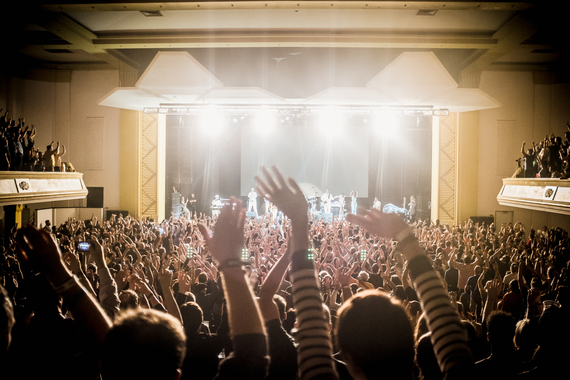
Asheville is a college town tucked at the foot of the Blue Ridge Mountains. It was here that Bob (née Robert) Moog, inventor of the Moog Modular synthesizer, settled in the late 1970s. In the years since his death in 2005, Moog Music has continued to thrive. Even in the age of bootlegged Pro Tools and audio plugins, Moog workers still hand-solder their in-demand analog synths, like the Minimoog Voyager, from a homespun factory on the edge of town.
Moog synthesizers are a hybrid of technology and art. In the early years, when they were festooned with colorful patch cables, they made strange bedfellows with the usual kit of rock n' roll, but musicians flocked to them regardless. Keith Emerson of Emerson, Lake & Palmer played a custom modular Moog synthesizer the size of a refrigerator. The Beatles used a Moog on Abbey Road. It's hardware--an alchemy of analog circuits, electronic modules, and oscillators--but, when operated by the right person, it becomes something greater than the sum of its parts.
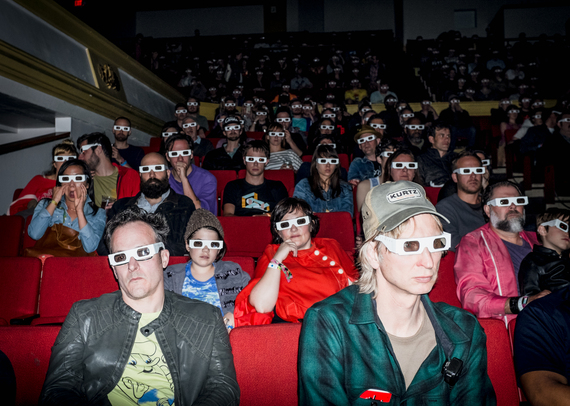
It makes sense, then, that Moogfest would become what it has: a place where technology and art interact, in wonky but undeniable synthesis. For me, Moogfest was the first occasion I've ever had to experience such synthesis. Besides playing music, I've been a science writer and science-fiction editor for many years. At Moogfest, I had the opportunity to present a panel, called "Science Fiction & The Synthesized Sound," which brought together an artist, two musicians, and a SETI researcher to discuss the music of the future, and the future of music. The same audience that thoughtfully took notes and asked probing questions of the panelists had been, only a day earlier, dancing like maniacs at my band's show. I can't imagine that this could happen anywhere else.
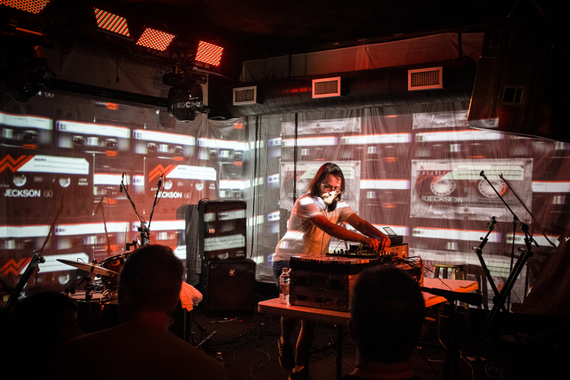
DJ Awesome Tapes From Africa
Moogfest was once a more traditional festival, but it metamorphosed this year into a celebration of art, science, music and technology -- TED filtered through a distortion pedal, if you will. For five days, the festival proposed a cocktail of daytime talks to be chased by music late into the night. The day panels featured many old-school synth pioneers -- Dave Smith, designer of the first programmable polyphonic synthesizer, and Herbert Deutsch, Bob Moog's closest collaborator -- and a thoughtful variety of future-learning artists and thinkers: the cyborg activist Neil Harbisson, Oxford futurist Nick Bostrom, the pop android Janelle Monáe, and dozens more.
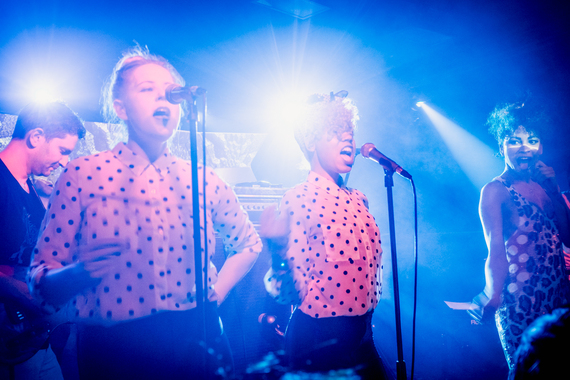
Escort at Asheville Music Hall
Geekery thrived everywhere. The festival's Modular Marketplace was a veritable science fair of home-brew analog and digital synthesizers from all over the country. Some festivalgoers could be seen sporting headset brainwave sensors, creating auditory maps of the streets of Asheville as they ogled a virtual-reality iPhone rendition of their locations. Others just rocked Google Glass at panels on cybernetics, alternative interfaces, and hardware hacking. Even Monáe, with whom I was fortunate enough to moderate a panel discussion, name-dropped Ray Kurzweil and the science fiction author Octavia Butler.
The programming was precisely engineered, it seemed, to create a far more inclusive Venn diagram between music and technology. Musicians were lured out into the daylight to twiddle knobs and soak up talks by electronic music pioneers, while scientists, artists, and philosophers found themselves, in the late hours of the night, at the temple of sounds both synthesized and not. In an age where increased access to tools and information allows us all to be Renaissance people, and specialization feels more and more isolating, such an open--to say nothing of fun--venue for cross-disciplinary engagement feels long overdue.
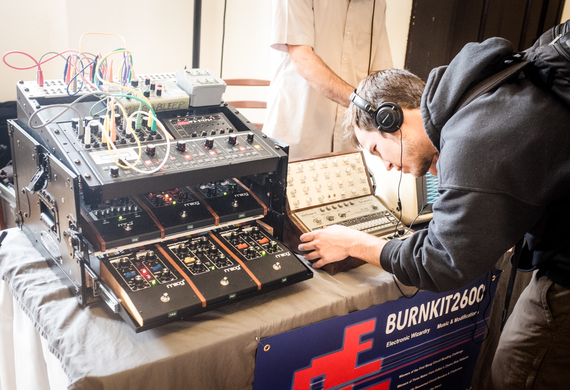
The Modular Marketplace, Moogfest's electronics pop-up shop
I commend Moogfest for its courage in creating this unorthodox, cheerfully intellectual festival. They have spotted a node in culture, where musicians teach themselves electronics to rewire keyboards and technologists create symphonies of data, that feels extremely relevant to our shared future. It's not an art show at the airport--if anything, it's an art show that is an airport. Or a spaceport. It takes you places. At Moogfest, every event is transportive, and behind every gate is something marvelous.
Photos courtesy of Nick Zinner